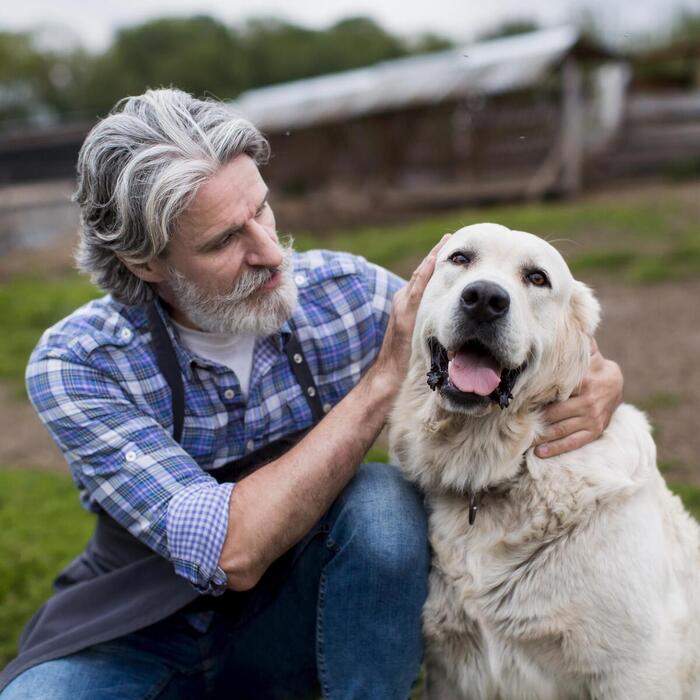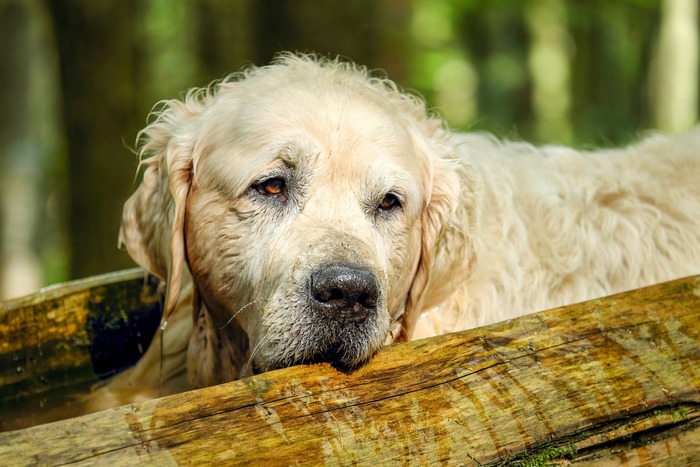2023-06-12
Aging in both humans and dogs is a process related to body changes, as well as changes in the energy level and general routine during the day. All these changes require us to provide necessary adjustments if we want to ensure that we and our paw friends will live a happy and healthy life and will enjoy our golden ages.
Unlike humans, dogs become seniors at different ages, based on their breed. However, just like us, they can also have a different experience with the process of aging, depending on how healthy they are and what type of lifestyle they have.
In order to provide our paw friends, who are getting seniors or who have already become seniors, with the best possible living conditions, we need to be considerate and thoughtful. Today we will give you useful tips on how to make your senior dog feel comfortable and taken care of.

Small dog breeds reach physical maturity at the age between 9 months and 1 year. Large dog breeds usually get physically mature between 12 and 14 months of age, while the extra large canines can continue growing until they reach the age of 2 years. Since dogs reach physical maturity at different ages, they also become seniors at different ages.
The representatives of small breeds are considered seniors at the age of 11–12 years, while medium-sized dog breeds become seniors at the age of 10 years. Large canines are deemed seniors at the age of 8 years, and extra large dogs at the age of 7 years.
During the process of aging, the energy level of our paw friends naturally decreases which causes them to be less mobile. Their hearing and visual abilities also worsen. Joint issues, dental issues, obesity as well as different health conditions related to the improper functioning of the inner organs are likely to occur.
Some dog breeds are prone to certain health issues, i.e. short-muzzled dogs are prone to respiratory problems (e.g. the Bulldog), as well as to eye problems (the Pug), other breeds have a tendency to become obese (e.g. the Labrador Retriever), to develop hip dysplasia (e.g. the German Shepherd)...etc.
Regardless of what breed your dog is, you should take care of them and make sure that they will stay healthy as long as possible.

Keeping your paw friend on a balanced diet is one of the most important conditions for them to stay healthy. Since senior dogs are less mobile and can easily gain weight, you should adjust your canine’s diet accordingly. There are different types of food on the market, specially designed to meet the nutritional requirements of canines based on their age. Food for senior dogs should be lower in fat and calories than food for adult dogs and especially food for puppies, who are still growing.
Fresh food like dog-safe vegetables and fruits as well as cooked fish (not fatty types of fish), rice, chicken, turkey meat, and canned pumpkin (in moderate amounts) can be very healthy supplements to your dog’s food.
It is recommended that you get informed of what food is safe for dogs, how to prepare it properly, and in what amounts it should be given prior to feeding your dog. Also, you should consult with a veterinarian first, so they provide information about the food that might be most suitable for your dog as an individual, based on their age, breed, health, weight, and lifestyle. Older dogs may be unable to chew solid food, due to dental issues, so food with a higher moisture content should also be provided. Make sure that you do not make any abrupt changes in your paw friend’s diet, but make a smooth transition if you have decided to completely change it or have been advised by a vet to do so.
It is best not to neglect annual veterinarian checkups.
Annual vaccination and regular parasite control, based on your location and your dog’s lifestyle, will also contribute to extending their lifespan. If your paw friend is not likely to be comfortable going to a vet and tends to misbehave prior to visiting the veterinarian's office or while being examined, you should conduct some training to help them change their attitude. Rewarding your dog for behaving well, and being calm, practicing simple commands like “sit” and “wait”, taking them for some test car rides, and giving them treats and praises when remaining well-mannered, will help them keep a positive attitude toward veterinarian visits and associate any related activities with a positive experience.
Energy levels of senior dogs decrease, which is absolutely natural. This does not mean though that you should neglect the physical activity of your paw friend and just let them lie down the entire day. This might have a negative impact on their joints and weight. Also, additional health issues can develop from leading a sedentary life.
To ensure, that the exercises fit your dog’s age and health, you may need to consult a veterinarian, who can help you make an exercise schedule and also recommend a program for your dog as an individual.
It is important that you do not let the desire to keep your dog in good shape make you put them through an overwhelming program. You should remember that their energy is much lower than it once was, and you should keep your expectations realistic.
Just like physical stimulation, mental stimulation plays an essential role in the lives of our paw friends. It can be even more beneficial for dogs who are less energetic and thus unable to enjoy physical activities to the fullest. Playing hide and seek, involving delicious treats, puzzle toys, or playing with a stuffed Kong or treat dispensing toys will keep your dog engaged throughout the day without requiring them to be overly physically active. Playing the cup game is also a fun way to spend time with your doggy and make their life as a senior interesting and joyful.
We use the term “environmental adjustments” to refer to all types of adjustments you may want or need to make in your home, so it can be more suitable for your senior dog. This can include providing your beloved paw family member with an orthopedic or a heated dog bedding/mat for more comfort. Orthopedic bedding is very suitable for senior dogs with joint issues, while heated bedding will warm to a temperature that matches your dog’s natural body temperature, without exceeding it. However, you should do research to find the model that is most suitable for your paw friend.
Other types of adjustments can include building a dog ramp that will ease your dog’s mobility or using a dog support sling. A support sling is a harness that is specially designed to help get your dog up, in case they are experiencing serious mobility issues.
You may also need to make your home as easy to navigate as possible, in case your dog’s visual skills have worsened. Do not make drastic rearrangements, as these are likely to confuse your paw friend and impede navigating the surroundings. If there are any items in your home that tend to obstruct your dog’s access to certain areas (that they are allowed to go), then you may need to remove them. Your dog’s mobility is not the same as it was, so your paw friend may be unable to deal with some sort of obstacle on their way.
Oral hygiene is a part of a dog’s health, that many owners tend to neglect. When dogs are getting older, any dental problems that were once mild, can develop into serious problems and even cause tooth loss or more serious health conditions. There are toothpaste brands specially designed for dogs as well as dental sticks, that will keep your canine’s teeth intact. If you notice that your dog has problems chewing their food and seems to be in pain, consult your veterinarian immediately.
As our beloved paw friends are getting older, their coats are likely to lose their neat appearance. If you want to prevent your dog from having a matted coat and dry skin, you should regularly brush them and have them groomed if needed. It is also recommended that you use shampoos suitable for older dogs that provide moisture, and nourishment and do not have strong smells or additives. Natural products are the best option.
Last but not least-regardless of the accommodations you provide for your dog, they will be truly happy, only if you truly show them how much you care for them. Do not neglect personal interaction and try to find time for your paw friend no matter how busy you are. Whether cuddling on the couch, playing with a ball or some new interesting game, practicing easy obedience tasks, or going on walks….your paw friend will appreciate your attention and the time you spend with them.